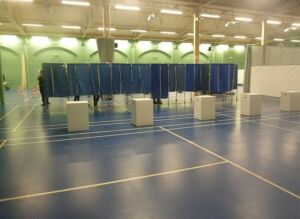News
Danish General Election still too close to predict
This article is more than 10 years old.
The latest polls show that this election might make history and will definitely be closer than usual

A sizeable minority won’t decide until they enter the voting box today (photo: Leif Jørgensen)
The Danish General Election today will be close – much closer than usual, the latest polls predict.
With 89 mandates predicted for the blue bloc and 86 for the present government and its support parties, Venstre leader Lars Løkke Rasmussen can look forward to getting the keys to the PM’s office back soon.
Just two mandates
However, it will only take two mandates switching from blue to red for PM Helle Thorning-Schmidt to stay in office for another four years. The poll prediction was carried out by Megafon for TV2 and Politiken last night.
As it looks right now, the election is set to be as close as it was in 1998, when one single mandate and 176 votes from the Faroe Islands secured Poul Nyrup Rasmussen the election, and it is suspected that the four mandates held by Greenland and the Faroes could once again come into play.
“The writers on TV shows couldn’t have come up with anything better than this,” the editor-in-chief at Fyns Amts newspaper, Troels Myhlenberg, told TV2 Politics.
“It looks like it’ll be close to the very last, and still there is something in me that tells me when it looks like it’ll be this close, it perhaps won’t. We will probably be surprised,” Myhlenberg continued.
The Alternativet election
According to the Megafon poll, 51.4 percent of the voters are going to vote for a red bloc party, and 48.4 percent for one in the red.
There has been little change in the last week, although it’s believed that Enhedlisten has lost a mandate to Alternativet, which now looks like it will storm into parliament with at least nine.
“I think this election will go down in history as ‘the Alternativet election’,” Myhlenberg told TV2 Politics.
“They will become just as big as SF and Radikale, and they could ultimately have the deciding vote. Which is crazy when you think about it, as just a month ago, people were ridiculing them.”
PM will get first option
According to the Megafon poll, the PM’s party Socialdemokraterne will once again be the biggest in Denmark, with 25.1 percent of the votes, ahead of Venstre on 20.4 percent, which will therefore give Thorning-Schmidt first option on forming a government.
But as things currently stand, the polls predict she will be unable to find the necessary mandates.










































